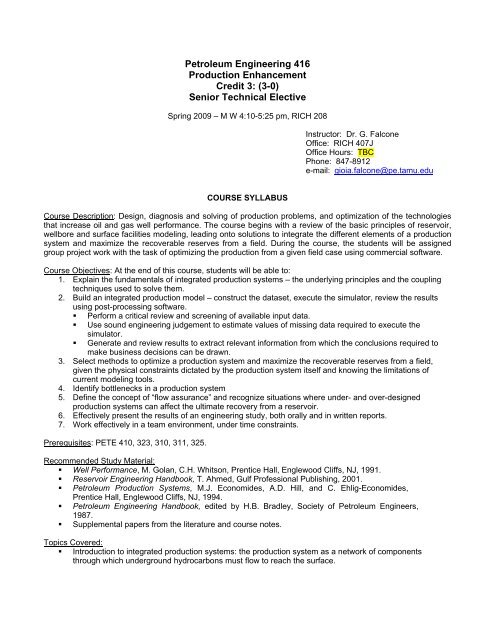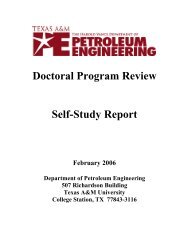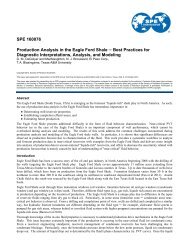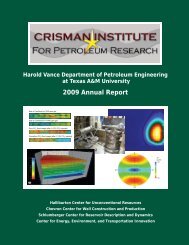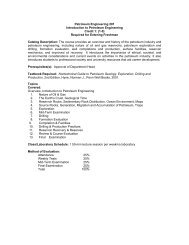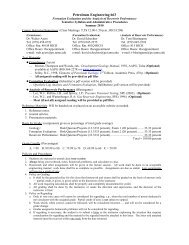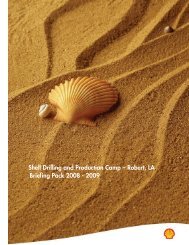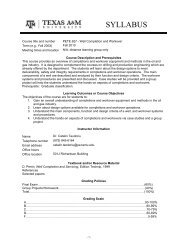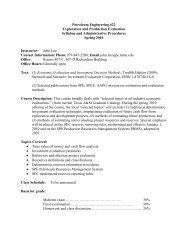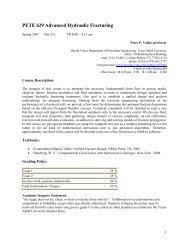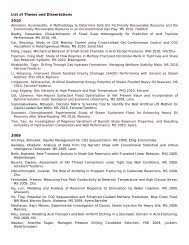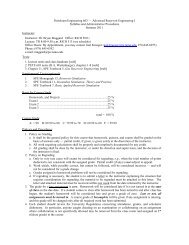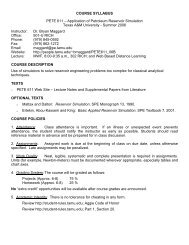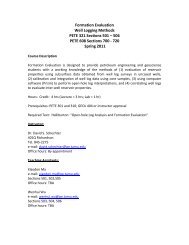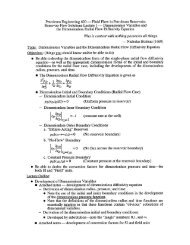Nontechnical Guide to Petroleum Geology, Exploration
Nontechnical Guide to Petroleum Geology, Exploration
Nontechnical Guide to Petroleum Geology, Exploration
Create successful ePaper yourself
Turn your PDF publications into a flip-book with our unique Google optimized e-Paper software.
<strong>Petroleum</strong> Engineering 416<br />
Production Enhancement<br />
Credit 3: (3-0)<br />
Senior Technical Elective<br />
Spring 2009 – M W 4:10-5:25 pm, RICH 208<br />
Instruc<strong>to</strong>r: Dr. G. Falcone<br />
Office: RICH 407J<br />
Office Hours: TBC<br />
Phone: 847-8912<br />
e-mail: gioia.falcone@pe.tamu.edu<br />
COURSE SYLLABUS<br />
Course Description: Design, diagnosis and solving of production problems, and optimization of the technologies<br />
that increase oil and gas well performance. The course begins with a review of the basic principles of reservoir,<br />
wellbore and surface facilities modeling, leading on<strong>to</strong> solutions <strong>to</strong> integrate the different elements of a production<br />
system and maximize the recoverable reserves from a field. During the course, the students will be assigned<br />
group project work with the task of optimizing the production from a given field case using commercial software.<br />
Course Objectives: At the end of this course, students will be able <strong>to</strong>:<br />
1. Explain the fundamentals of integrated production systems – the underlying principles and the coupling<br />
techniques used <strong>to</strong> solve them.<br />
2. Build an integrated production model – construct the dataset, execute the simula<strong>to</strong>r, review the results<br />
using post-processing software.<br />
• Perform a critical review and screening of available input data.<br />
• Use sound engineering judgement <strong>to</strong> estimate values of missing data required <strong>to</strong> execute the<br />
simula<strong>to</strong>r.<br />
• Generate and review results <strong>to</strong> extract relevant information from which the conclusions required <strong>to</strong><br />
make business decisions can be drawn.<br />
3. Select methods <strong>to</strong> optimize a production system and maximize the recoverable reserves from a field,<br />
given the physical constraints dictated by the production system itself and knowing the limitations of<br />
current modeling <strong>to</strong>ols.<br />
4. Identify bottlenecks in a production system<br />
5. Define the concept of “flow assurance” and recognize situations where under- and over-designed<br />
production systems can affect the ultimate recovery from a reservoir.<br />
6. Effectively present the results of an engineering study, both orally and in written reports.<br />
7. Work effectively in a team environment, under time constraints.<br />
Prerequisites: PETE 410, 323, 310, 311, 325.<br />
Recommended Study Material:<br />
• Well Performance, M. Golan, C.H. Whitson, Prentice Hall, Englewood Cliffs, NJ, 1991.<br />
• Reservoir Engineering Handbook, T. Ahmed, Gulf Professional Publishing, 2001.<br />
• <strong>Petroleum</strong> Production Systems, M.J. Economides, A.D. Hill, and C. Ehlig-Economides,<br />
Prentice Hall, Englewood Cliffs, NJ, 1994.<br />
• <strong>Petroleum</strong> Engineering Handbook, edited by H.B. Bradley, Society of <strong>Petroleum</strong> Engineers,<br />
1987.<br />
• Supplemental papers from the literature and course notes.<br />
Topics Covered:<br />
• Introduction <strong>to</strong> integrated production systems: the production system as a network of components<br />
through which underground hydrocarbons must flow <strong>to</strong> reach the surface.


